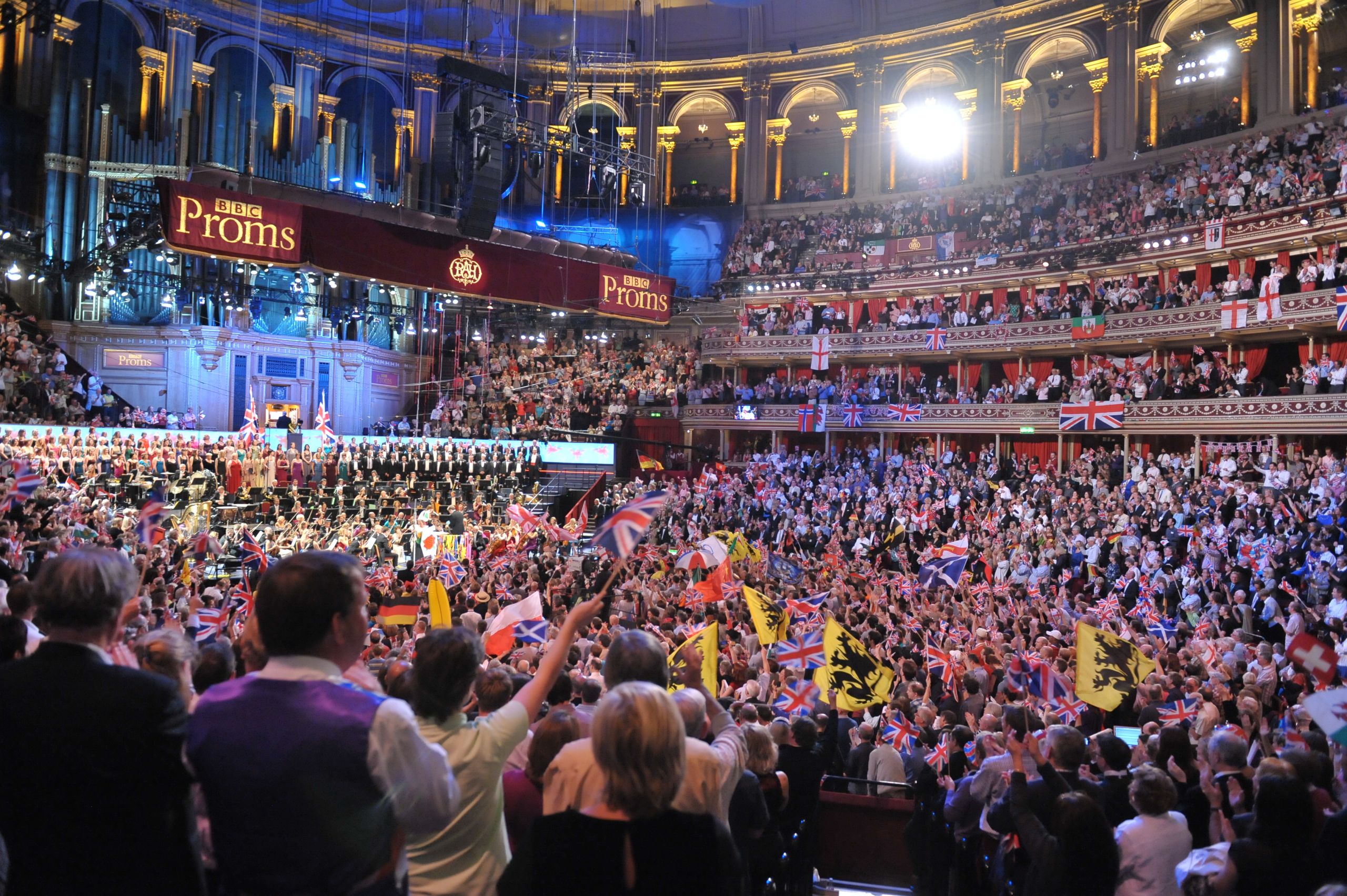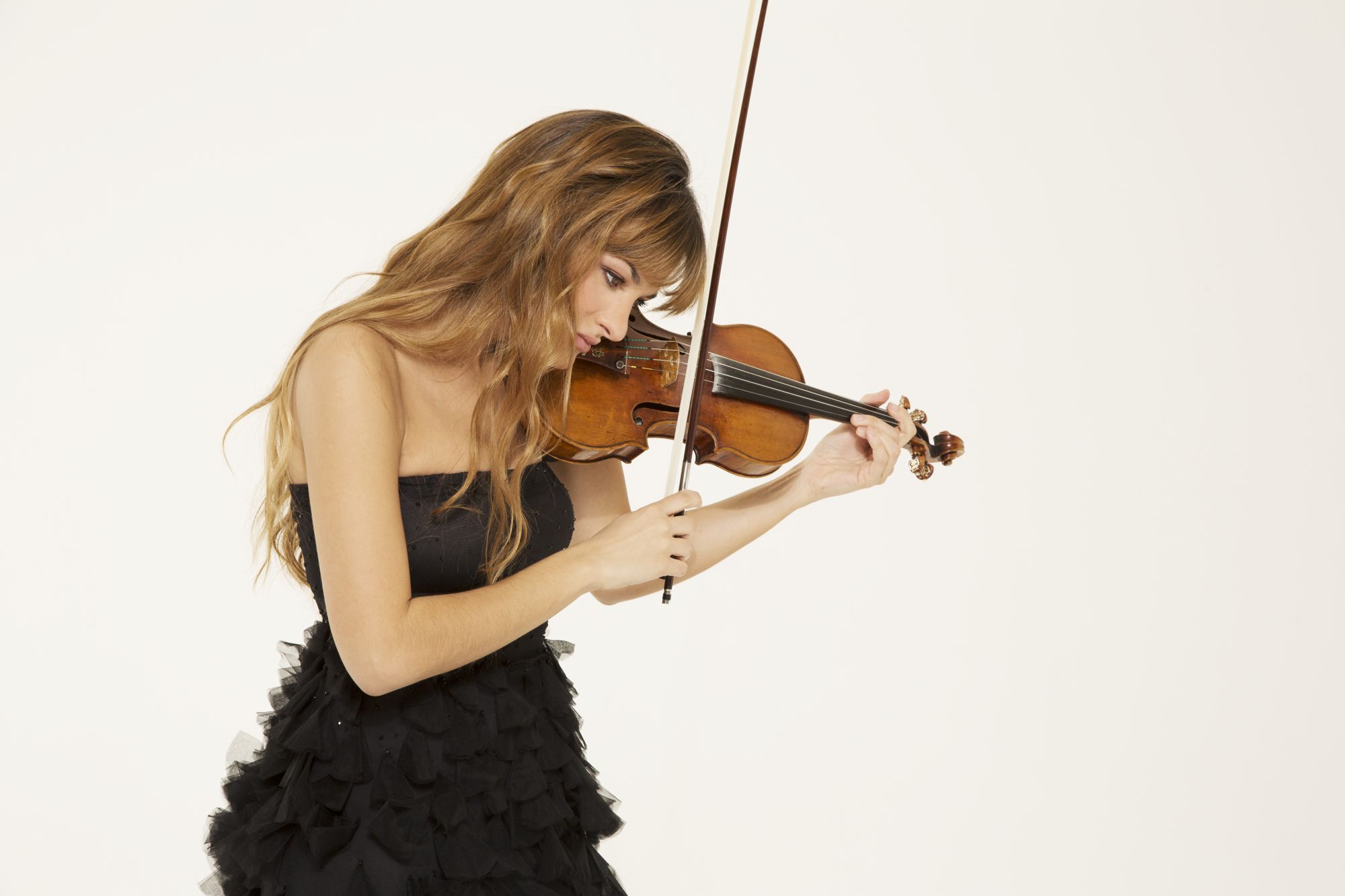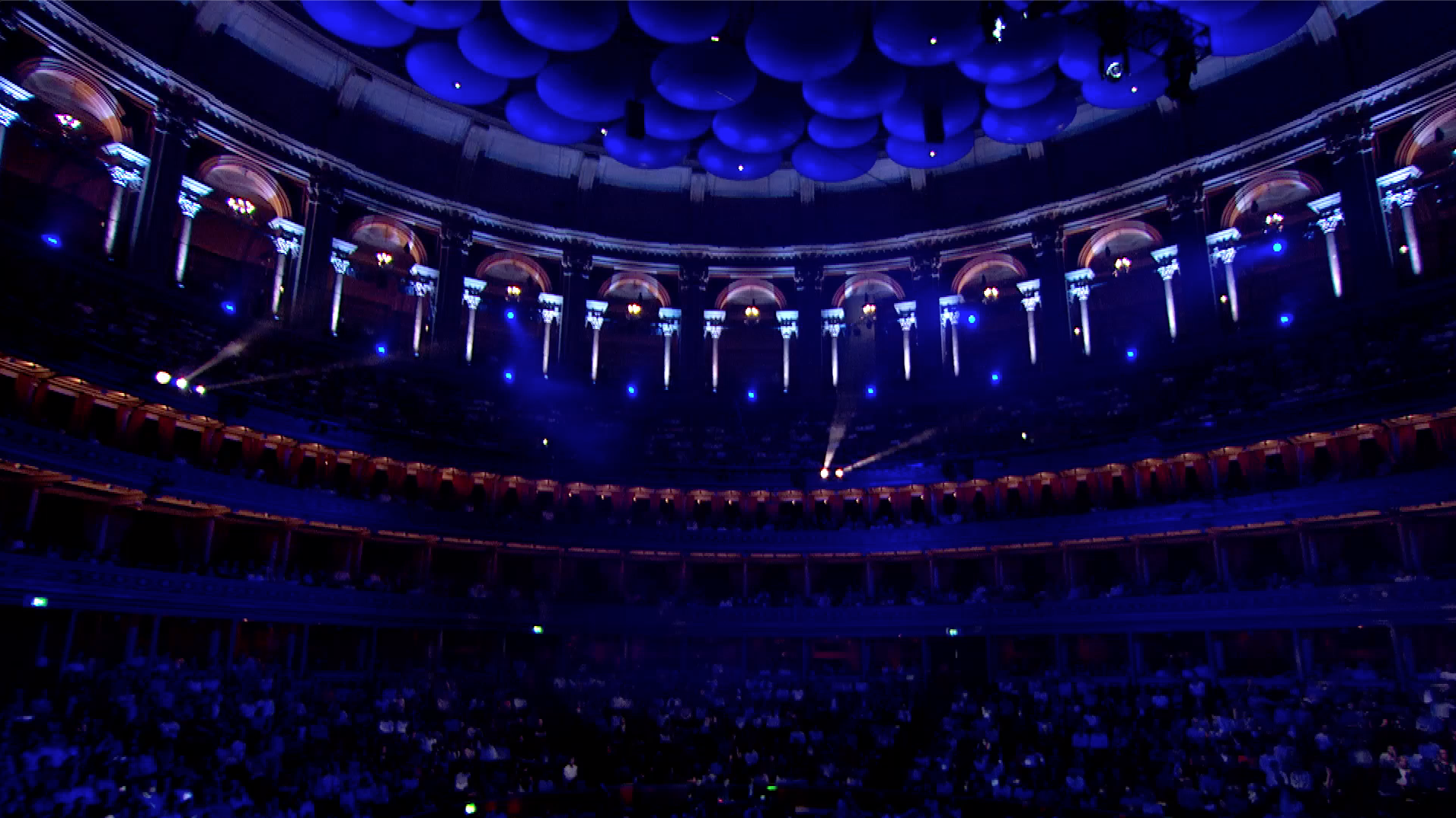Last Night of the Proms 2020
Saturday 12 September, 8.00pm–c9.50pm

Wolfgang Amadeus Mozart
The Marriage of Figaro – overture; ‘Deh vieni, non tardar’ 9’
Richard Strauss
Morgen! 4’
Andrea Tarrodi
Solus c6’
Â鶹ԼÅÄ commission: world premiere
Stephen Sondheim
A Little Night Music – Night Waltz; ‘The Glamorous Life’ 8’
Jean Sibelius
Impromptu for strings 6’
Ralph Vaughan Williams
The Lark Ascending 16’
Errollyn Wallen
Jerusalem – our clouded hills 4’
Â鶹ԼÅÄ commission: world premiere
arr. Henry Wood
Fantasia on British Sea-Songs 14’
concluding with:
Thomas Arne
Rule, Britannia!
Edward Elgar, arr. Anne Dudley
Pomp and Circumstance March No. 1 in D major
(‘Land of Hope and Glory’) 6’
Richard Rodgers & Oscar Hammerstein II
Carousel – ‘You’ll never walk alone’ 5’
Hubert Parry
Jerusalem 3’
arr. Benjamin Britten
The National Anthem 2’
Golda Schultz soprano
Nicola Benedetti violin
Richard Pearce organ
Â鶹ԼÅÄ Singers
Â鶹ԼÅÄ Symphony Orchestra
Dalia Stasevska conductor
Lisa Batiashvili, the advertised violinist, has had to withdraw from tonight’s performance owing to illness. The Â鶹ԼÅÄ Proms is grateful to Nicola Benedetti for taking her place at short notice.

This concert is broadcast live by Â鶹ԼÅÄ Radio 3 and Â鶹ԼÅÄ One. You can listen to any of the 2020 Proms concerts on Â鶹ԼÅÄ Sounds or watch on Â鶹ԼÅÄ iPlayer until Monday 12 October.
Welcome to the Last Night of the Proms 2020
In a year like no other, the Last Night of the Proms – always a celebration of the world-class music-making throughout the season – reflects the many experiences and moods we have encountered during the Covid-19 pandemic.
Finnish conductor Dalia Stasevska, the Â鶹ԼÅÄ Symphony Orchestra’s Principal Guest Conductor, presides over a Last Night with – for the first time – no live spectators, but with millions listening and watching worldwide.
Excerpts from Mozart’s witty opera about marital – and extra-marital – love lead to Strauss’s rapturous ‘Morgen!’, a wedding gift to his wife, opening with the thought that ‘Tomorrow the sun will shine again’.
Also tonight there’s renewal in a specially commissioned reimagining of Parry’s ‘Jerusalem’ by Errollyn Wallen; consolation in Sibelius’s serene Impromptu for strings; and celebration in a tribute to one of the great creative spirits of American musical theatre – Stephen Sondheim – in his 90th-birthday year.
There are also birds of contrasting hues. Whether in the soaring violin of Vaughan Williams’s The Lark Ascending or in the birdsong that concludes Swedish composer Andrea Tarrodi’s new commission Solus – whose title also acknowledges the loneliness of lockdown – these winged songsters express freedom and optimism.
With rising star Golda Schultz and Proms regular Nicola Benedetti (returning for her second appearance this season) – as well as the communal Last Night favourites ‘Rule, Britannia!’, ‘Land of Hope and Glory’ and ‘Jerusalem’ – it’s a jubilant, socially distanced musical party designed to bring us all together.


Welcome to the Last Night of the Proms 2020
In a year like no other, the Last Night of the Proms – always a celebration of the world-class music-making throughout the season – reflects the many experiences and moods we have encountered during the Covid-19 pandemic.
Finnish conductor Dalia Stasevska, the Â鶹ԼÅÄ Symphony Orchestra’s Principal Guest Conductor, presides over a Last Night with – for the first time – no live spectators, but with millions listening and watching worldwide.
Excerpts from Mozart’s witty opera about marital – and extra-marital – love lead to Strauss’s rapturous ‘Morgen!’, a wedding gift to his wife, opening with the thought that ‘Tomorrow the sun will shine again’.
Also tonight there’s renewal in a specially commissioned reimagining of Parry’s ‘Jerusalem’ by Errollyn Wallen; consolation in Sibelius’s serene Impromptu for strings; and celebration in a tribute to one of the great creative spirits of the American musical theatre – Stephen Sondheim – in his 90th-birthday year. There are also birds of contrasting hues. Whether in the soaring violin of Vaughan Williams’s The Lark Ascending or in the birdsong that concludes Swedish composer Andrea Tarrodi’s new commission Solus – whose title also acknowledges the loneliness of lockdown – these winged songsters express freedom and optimism.
With rising star Golda Schultz and Proms regular Nicola Benedetti (returning for her second appearance this season) – as well as the communal Last Night favourites ‘Rule, Britannia!’, ‘Land of Hope and Glory’ and ‘Jerusalem’ – it’s a jubilant, socially distanced musical party designed to bring us all together.


Wolfang Amadeus Mozart (1756–91)
The Marriage of Figaro (1786) – Overture; ‘Deh vieni, non tardar’

Golda Schultz soprano
From Twelfth Night to Downton Abbey, goings-on in grand households upstairs and downstairs have proved as inviting for audiences as they have for dramatists. The same applies to musical dramatists. In 1786 Mozart teamed up with librettist Lorenzo Da Ponte, who took French playwright Beaumarchais’s runaway hit play from two years earlier, calmed down the more overtly political speeches that had seen the play banned in Vienna and, in just six weeks, delivered the libretto for what would become arguably the finest comic opera ever written.

Golda Schultz as Susanna in a production of The Marriage of Figaro for La Scala, Milan, 2016 (Brescia e Amisano/Teatro alla Scala)
Golda Schultz as Susanna, 2016 (Brescia e Amisano/Teatro alla Scala)
The helter-skelter scurrying strings at the start of The Marriage of Figaro’s overture set the scene for the hectic domestic activities during one action-packed day in the Almaviva household in which the Countess’s servant Susanna is to be married to manservant Figaro. Which would be fine, were it not for the fact that the Count wishes to take advantage of his ancient feudal ‘right’ to bed Susanna. A wildly complicated, lust-fuelled plot leaps to life, involving lies and spies, duplicity and disguises, and even what is now the soap-opera staple of a long-lost child.
Everything climaxes in the final act in the garden at night, where Susanna sings Deh vieni, non tardar, an aria of overt seduction. What makes it dramatic is that her song of longing to give in to desire is a pretence: newly-wed Susanna appears to be singing to the Count but she’s really making sure that she’s overheard by her now-jealous husband so as to teach him a lesson. All that in music of limpid, melting beauty.
Programme note © David Benedict Culture critic and broadcaster David Benedict is chief London theatre critic for ‘Variety’ and weekly columnist for ‘The Stage’. He is currently writing the authorised biography of Stephen Sondheim for Random House (USA) and Picador (UK).
Richard Strauss (1864–1949)
Morgen!
(1894, arr. 1897)

Golda Schultz soprano
Igor Yuzefovich violin
The opening alone is magical. The yearning solo violin line calling out over slow arpeggios from the harp is so extraordinarily expressive that it seems as if a singer would be surplus to requirements. Then, just as the phrase seems about to end, Strauss brings in the soprano to complete the line with ‘Und morgen wird die Sonne wieder scheinen’ (And tomorrow the sun will shine again). What’s even more remarkable about this exquisite deployment of orchestral writing is that this, a wedding present to his wife Pauline, was originally written in 1894 for just voice and piano. In this, his own orchestration made three years later, Strauss sends the voice spinning over the accompaniment, barely rising above pianissimo yet expressing entire worlds of imagined bliss in a tiny masterpiece of restraint.
Programme note © David Benedict
Andrea Tarrodi (born 1981)
Solus
(2020)
Â鶹ԼÅÄ commission: world premiere

Solus for orchestra was written for the Last Night of the Proms and is a comment on the times we are living in, under the shadow of Covid-19. Many people have had to face loneliness during this period, and my piece takes its title from the Latin for ‘lonely’.
It begins with a dark tremolo in timpani, cello and double basses. Then a small ‘virus’ starts to develop in the flutes and clarinets while the brass, oboes and bassoons enter with a pulsating chord that billows back and forth. The ‘virus’ then transfers into the strings and the rest of the winds, and keeps growing as it is taken over by the whole orchestra. The music gradually grows through a large crescendo towards an fff (very, very loud) chord. And then at last, after the final burst, the music travels out into wild nature, where we hear the birds sing …
Programme note © Andrea Tarrodi
Stephen Sondheim (born 1930)
A Little Night Music (1973) –
Night Waltz; ‘The Glamorous Life’*
*First performance at the Proms

Golda Schultz soprano
Hardly the first musical to be based on a film – Alan Jay Lerner based My Fair Lady (1956) on the screenplay of Shaw’s Pygmalion – A Little Night Music is, however, the only one (so far) to be based on a film by Ingmar Bergman: Smiles of a Summer Night. Sondheim’s 1973 musical, written with librettist Hugh Wheeler, is a delicious confection, a nostalgic comedy of (bad) manners in love, set mostly on a Swedish country estate around 1900. To match the mood and period elegance of the setting, Sondheim cunningly chose to write the entire score (with the exception of a handful of bars) in variations on waltz-time. That much is clear from the dashing opening Night Waltz, which acts as the show’s overture – an orchestral introduction with consciously Ravel-like textures including spotlit woodwind dancing over strings and harp with horns promising plenty of intrigue.
Although the show is widely celebrated for Sondheim’s greatest hit, ‘Send in the Clowns’, the rest of the sophisticated score is also treasurable, not least for the song The Glamorous Life, in which the actress-heroine Désirée, her hope-filled daughter and her deeply sceptical mother swap wildly contrasting viewpoints. Hal Prince’s later film version (1977) was a legendary failure, thanks in no small part to Elizabeth Taylor being painfully miscast as Désirée. But one of the high points is Sondheim’s rewrite of the song as a solo for the daughter, which is the version sung tonight.
Programme note © David Benedict
Jean Sibelius (1865–1957)
Impromptu for strings
(1893, arr. 1894)
First performance at the Proms

Like the Strauss song we heard earlier, Sibelius’s Impromptu for strings began life as a piano piece before being orchestrated. But, where the original version contrasts cascading ripple effects with declamatory chords and a defiant melody line, the string version achieves a much more unified, calm, even mournful tone. That’s especially clear in the outer sections that flank the more energetic central passage pitting flowing phases in the first violins against cello arpeggios.
This is one of Sibelius’s early pieces, but his command of string playing, a hallmark of his orchestral writing, is already apparent. Although a skilled violinist, he had given up on his dream of being a professional soloist to devote himself to composition. That swiftly paid off, since the Karelia Suite, one of his best-known works, appeared later the same year.
Programme note © David Benedict
Ralph Vaughan Williams (1872–1958)
The Lark Ascending
(1914, rev. 1920)

Nicola Benedetti violin
Long before Vaughan Williams was inspired by George Meredith’s 1881 poem ‘The Lark Ascending’, 12 lines from which are inscribed above his score, larks had long been associated with heralding the day. In his Sonnet 29, Shakespeare wrote: ‘the lark at break of day arising / From sullen earth, sings hymns at heaven’s gate.’
Chosen by listeners as the nation’s favourite piece of music in Radio 4’s Desert Island Discs poll, it is a unique piece that, once again, began life in a different form from the one we know best. Vaughan Williams wrote it in 1914 for violin and piano but, six years later, rescored it for solo violin and chamber orchestra. With a solo cadenza at the very first entry and another swiftly following, the violinist has extended passages of complete rhythmic freedom, highly unusual for the time. These not only express the bird’s song and flight but also allow for the soloist’s individual interpretations to metaphorically take wing, as Vaughan Williams’s slowly shifting accompaniment evokes the heat haze of morning shimmering over the countryside.
Programme note © David Benedict
Errollyn Wallen (born 1965)
Jerusalem – our clouded hills (2020)
Â鶹ԼÅÄ commission: world premiere

Golda Schultz soprano
Hubert Parry’s setting of William Blake’s ‘And did those feet in ancient time’, written on 10 March 1916, was commissioned by Fight for Right, an organisation dedicated to boosting morale in the Armed Forces. After its first performance, however, pacifist Parry withdrew his support. In response to a request for the piece from influential feminist Millicent Fawcett, to whose causes he and his wife were strongly sympathetic, he replied, ‘I wish indeed it might become the Women Voters' hymn, as you suggest. People seem to enjoy singing it. And having the vote ought to diffuse a good deal of joy too. So they would combine happily.’

Christabel Pankhurst speaking at a suffragette rally in London’s Trafalgar Square, 1908: Parry was pleased for ‘Jerusalem’ to be sung as an anthem in support of the women’s right to vote (Bridgeman Images)
Christabel Pankhurst speaking at a suffragette rally in London’s Trafalgar Square, 1908 (Bridgeman Images)
Composer Errolyn Wallen played ‘Jerusalem’ regularly for her school and has loved it and Elgar’s arrangement, a Last Night of the Proms mainstay, ever since. But Covid-19 has meant her new work based on the hymn utilises a much-reduced orchestra. As she told Â鶹ԼÅÄ’s Front Row, ‘I don’t have a tuba, a bass trombone or a bass drum … but I do have the organ.’ Not to mention soprano Golda Schultz.
Holding firm to Parry’s celebrated tune, Wallen has added a blues feeling and African rhythm. Subtitled ‘our clouded hills’, her piece is dedicated to the Windrush generation and encourages a communion of Commonwealth nations in a short interlude, to her own words, introduced between the second and third verses. ‘The people coming over from the former British Empire were probably even more patriotic than people living in the United Kingdom, so the hymn would have been known to them.’
Programme note © David Benedict
arr. Henry Wood (1869–1944)
Fantasia on British Sea-Songs
concluding with:
Thomas Arne (1710–78)
Rule, Britannia!

1 The Saucy Arethusa –
2 Tom Bowling
3 Hornpipe: Jack’s the Lad
National songs from Scotland, Wales and Northern Ireland, pre-recorded in their respective host nations:
4 Ali Levack: Derik’s Bothy Antics* from V&A Dundee
5 Ar lan y môr (Beside the sea) † from Tenby
6 The Sailor’s Return ‡ from the SS ‘Nomadic’, Titanic Slipways, Belfast
7 See, the conqu’ring hero comes!
8 Rule, Britannia!
*Ali Levack pipes
† Beth Celyn singer, VRï
‡ Martha Guiney flute, Shane McCartan guitar
Â鶹ԼÅÄ Singers
‘I little dreamed when I arranged this item – merely to finish a programme for a special occasion – that the Promenade public would demand its repetition on the last night of the season for ever afterwards.’ So wrote Proms founder-conductor Henry Wood of his Fantasia on British Sea-Songs, which he compiled and first conducted in 1905 to mark the centenary of the Battle of Trafalgar.
This compilation of nautical-themed songs – the contents of which can alter from year to year – has become a long-standing feature of the Last Night of the Proms, even if it hasn’t appeared in every season of late.

The selection opens with the cheerily bombastic ‘The Saucy Arethusa’, originally featuring a euphonium solo. The gently mournful ‘Tom Bowling’, led by solo cello (normally accompanied in the Royal Albert Hall by displays of hankies and crocodile tears among the Prommers), is Wood’s arrangement of Charles Dibdin’s song commemorating Dibdin’s own brother, a captain who died at sea. That’s followed by ‘Jack’s the Lad’, the beloved sailor’s hornpipe with its traditional race to the finish line (and customary knee-bobbing in the Hall).
A selection of ‘sea-songs’ follows, pre-recorded in locations in the other nations of the UK. From Scotland, Ali Levack plays ‘Derik’s Bothy Antics’, his own upbeat reel written for a family friend. ‘Derik took me fishing for the first time when I was a lad, on the Conan River,’ recalls Levack. The title refers to the hut his friend built, the scene of many a party. Then singer Beth Celyn and folk trio VRï present an arrangement of the traditional Welsh folk song ‘Ar lan y môr’ (Beside the sea). From Northern Ireland comes ‘The Sailor’s Return’, played on Belfast’s Titanic Slipways on the deck of SS Nomadic, the last surviving steamship of the White Star Line, which ferried first- and second-class travellers to the ill-fated Titanic.
From there, a burst of Handel’s resplendent ‘See the conqu’ring hero comes!’ from his oratorio Judas Maccabaeus (cue audience whistling) leads to the most famous of all the movements, ‘Rule, Britannia!’, tonight in Thomas Arne’s original 1740 arrangement (a Covid-friendly smaller orchestra than Wood’s more extravagantly scored version), with the Â鶹ԼÅÄ Singers leading the global virtual singalong.
Programme note © David Benedict
When Britain first at Heavn’s command
Arose from out the azure main,
This was the charter of the land,
And guardian angels sang this strain:
Rule, Britannia! Britannia, rule the waves:
Britons never will be slaves.
Still more majestic shalt thou rise,
More dreadful, from each foreign stroke;
As the loud blast that tears the skies,
Serves but to root the native oak.
Rule, Britannia! Britannia, rule the waves:
Britons never will be slaves.
The Muses, still with freedom found,
Shall to thy happy coast repair.
Blest Isle! With matchless beauty crown’d,
And manly hearts to guard the fair.
Rule, Britannia! Britannia, rule the waves:
Britons never will be slaves.
attrib. James Thomson (1700–48)
Edward Elgar (1857–1934) arr. Anne Dudley (born 1956)
Pomp and Circumstance
March No. 1 in D major
(‘Land of Hope and Glory’)
(1901, arr. 2020)

Â鶹ԼÅÄ Singers
Elgar was so pleased with it – he described it as ‘a tune that comes once in a lifetime’ – that he considered saving it for a symphony. But he soon jettisoned that idea and used it instead at the heart of his Pomp and Circumstance March No. 1. The tune, of course, is now known as ‘Land of Hope and Glory’. Elgar’s march, the first of a projected set of six, premiered successfully in Liverpool on 19 October 1901 and arrived two days later at the Proms, where it so ignited the audience that it was immediately encored. Twice.
Of her new arrangement Anne Dudley says: ‘In studying and transcribing Elgar’s score in great detail, as I have done over these past few weeks, I’ve come to appreciate anew his genius and his complete mastery of the orchestral tutti.’ The challenge was to keep the sonority and majesty of Elgar’s original, while writing for an orchestra about half the size. ‘The single percussionist has to be something of a one-man band to cover the side drum, cymbals, bass drum and tambourine, all usually allocated to separate players.’
Programme note © David Benedict
Land of Hope and Glory,
Mother of the Free,
How shall we extol thee
Who are born of thee?
Wider still and wider
Shall thy bounds be set;
God, who made thee mighty,
Make thee mightier yet.
A. C. Benson (1862–1925)
Richard Rodgers (1902–79) and Oscar Hammerstein II (1895–1960)
Carousel (1945) – ‘You’ll never
walk alone’

Golda Schultz soprano
Â鶹ԼÅÄ Singers
‘There are no second acts in American lives.’ The career of composer Richard Rodgers stands as a stern rebuke to that famous assertion by F. Scott Fitzgerald. After well over a decade of substantial hits with lyricist Lorenz Hart, Rodgers teamed up with librettist and lyricist Oscar Hammerstein II to even more successful effect. Their first show, Oklahoma!, was a runaway hit whose musically sustained seriousness of purpose changed musical theatre history for ever. Two years later, in 1945, they opened their even more formally daring Carousel, which includes the supremely comforting, hymn-like ‘You’ll never walk alone’. In 1963 Liverpudlian band Gerry and the Pacemakers turned it into a hit single, which led to it being adopted by Liverpool FC. Since then, it has become a hugely popular anthem of hope and support, not least for medical staff during the current pandemic.
When you walk through a storm,
Hold your head up high,
And don’t be afraid of the dark.
At the end of the storm
Is a golden sky,
And the sweet silver song of a lark.
Walk on through the wind,
Walk on through the rain,
Though your dreams be tossed and blown.
Walk on, walk on with hope in your heart,
And you’ll never walk alone;
You’ll never walk alone.
Oscar Hammerstein II
Hubert Parry (1848–1918)
Jerusalem (1916)

Â鶹ԼÅÄ Singers
Richard Pearce organ
The honours accrued by Parry – being made a baronet, becoming head of the Royal College of Music and the only composer to be elected as a member of the Royal Yacht Squadron – suggest a man dedicated to the preservation of convention. Yet his daughter Dorothea described him as ‘the most naturally unconventional man I have known. He was a Radical, with a very strong bias against Conservatism.’
It is somewhat ironic, therefore, that he is most remembered not for his grander, idiosyncratic compositions including five symphonies and his deeply moving, unaccompanied choral masterpiece Songs of Farewell, but for two beloved unison songs: the hymn tune for ‘Dear Lord and father of mankind’ and his setting ‘Jerusalem’. He died in 1918 of Spanish flu in the global pandemic. The plaque in Gloucester cathedral in his memory includes the line: ‘Long these familiar walls shall re-echo thy song.’
And did those feet in ancient time
Walk upon England’s mountains green?
And was the Holy Lamb of God
On England’s pleasant pastures seen?
And did the Countenance Divine
Shine forth upon our clouded hills?
And was Jerusalem builded here
Among these dark Satanic mills?
Bring me my bow of burning gold!
Bring me my arrows of desire!
Bring me my spear! O clouds unfold!
Bring me my Chariot of Fire!
I will not cease from mental fight;
Nor shall my sword sleep in my hand
Till we have built Jerusalem
In England’s green and pleasant land.
William Blake (1757–1827)
arr. Benjamin Britten (1913–76)
The National Anthem (1961, rev. 1967)

Â鶹ԼÅÄ Singers
Britten’s arrangement of the UK National Anthem – made for the 1961 Leeds Festival, and then revised for a smaller orchestra for the opening of London’s Queen Elizabeth Hall in 1967 – defies expectation. He holds on to the traditional basic harmony but instead of opting for the usual loud and lusty cry, he delivers the entire first verse at a hushed and wholly heartfelt pianissimo. Only after that do the strings and percussion rise triumphantly for the resplendent reprise.
In 2012 the image of the Queen, wholly dedicated to her country yet formal in demeanour, was delightfully changed via the filmed insert at the Olympics opening ceremony showing her and James Bond aka Daniel Craig apparently parachuting into the stadium from a helicopter. But decades earlier she exhibited that same droll wit when she heard Britten’s arrangement performed at the royal opening of the Snape Maltings concert hall in 1967. Afterwards, one of the singers in the choir noted that the Queen declared that she had never been so affected by the National Anthem. ‘And I have heard it once or twice before …’
Programme note © David Benedict
God save our gracious Queen!
Long live our noble Queen!
God save the Queen!
Send her victorious,
Happy and glorious,
Long to reign over us,
God save the Queen!
Thy choicest gifts in store
On her be pleased to pour,
Long may she reign;
May she defend our laws
And ever give us cause
To sing with heart and voice
God save the Queen!
God save the Queen!
God save the Queen!
Biographies
Dalia Stasevska conductor

Dalia Stasevska (Jarmo Katila)
Dalia Stasevska (Jarmo Katila)
Dalia Stasevska studied violin, viola and composition at the Tampere Conservatory and the Sibelius Academy, Helsinki. As a conductor her teachers include Mikko Franck, Hannu Lintu, Susanna Mälkki, Sakari Oramo, Jorma Panula, Jukka-Pekka Saraste and Leif Segerstam.
She became Principal Guest Conductor of the Â鶹ԼÅÄ Symphony Orchestra in July last year, making her Â鶹ԼÅÄ Proms debut with the orchestra the following month in a programme of Sibelius, Weinberg and Tchaikovsky.
Highlights of this season have included concerts with the Montreal Symphony Orchestra, National Symphony Orchestra (Washington DC), Orchestre National de France and Orchestre National de Belgique, as well as returns to the Helsinki Philharmonic Orchestra, Finnish Radio Symphony and Swedish Chamber Orchestra.
A passionate opera conductor, she recently returned to Norwegian Opera to conduct Madam Butterfly following her debut there conducting Lucia di Lammermoor in 2018. Earlier opera performances include Don Giovanni for the Royal Swedish Opera, Eugene Onegin for Opéra de Toulon, The Cunning Little Vixen for Finnish National Opera and Sebastian Fagerlund’s Höstsonaten (‘Autumn Sonata’) at the 2018 Baltic Sea Festival in Stockholm, featuring Anne Sofie von Otter.
Nicola Benedetti violin

Nicola Benedetti (Simon Fowler)
Nicola Benedetti (Simon Fowler)
Nicola Benedetti was born in Scotland of Italian heritage. She began violin lessons at the age of 5 and went on to study at the Yehudi Menuhin School. She is now one of the most sought-after and popular violinists of her generation.
Conductors with whom she has worked include Vladimir Ashkenazy, Jiří Bělohlávek, Christoph Eschenbach, James Gaffigan, Valery Gergiev, Alan Gilbert, Jakub Hrůša, Vladimir Jurowski, Zubin Mehta, Vasily Petrenko, Donald Runnicles, Pinchas Zukerman and Jaap van Zweden.
This season she made her debut with the Vienna Symphony and toured Asia with the Deutsches Symphonie-Orchester Berlin under Robin Ticciati. She also appeared with the City of Birmingham Symphony Orchestra under Klaus Mäkelä, London Philharmonic Orchestra under Vladimir Jurowski and London Symphony Orchestra under Michael Tilson Thomas. Last week she appeared at the Proms, performing in double concertos by Bach and Vivaldi with the Orchestra of the Age of Enlightenment. Next season she is due to give the premiere of Mark Simpson’s Violin Concerto with the London Symphony Orchestra under Gianandrea Noseda.
Â鶹ԼÅÄ Young Musician of the Year 2004 and winner of a GRAMMY (for Wynton Marsalis’s Violin Concerto) and two Classical BRIT Awards, she has recorded concertos by Bruch, Glazunov, Mendelssohn, Shostakovich, Szymanowski and Tchaikovsky. She recently launched the Benedetti Foundation, supporting music education for young people and teachers. She became the youngest ever recipient of the Queen’s Medal for Music in 2016 and was made CBE last year. She plays the 1717 ‘Gariel’ Stradivari violin.
Golda Schultz soprano

Golda Schultz (Dario Acosta)
Golda Schultz (Dario Acosta)
Born in South Africa, Golda Schultz studied at New York’s Juilliard School and the Opera Studio of the Bavarian Staatsoper. She has appeared as Sophie (Der Rosenkavalier) at the Salzburg Festival, Pamina (The Magic Flute) for the Metropolitan Opera (New York) and Countess (The Marriage of Figaro) for Glyndebourne.
Opera highlights of the 2019–20 season include Sophie and Clara (Porgy and Bess) for the Metropolitan Opera and Micaëla (Carmen) for the Bavarian Staatsoper. In concert this season she appeared with the LA Philharmonic both under Esa-Pekka Salonen and Gustavo Dudamel, the Bavarian Radio Symphony Orchestra in a concert under Zubin Mehta in memory of the orchestra’s late Music Director Mariss Jansons, and with the Philharmonia Orchestra in a recreation of the famous 1808 concert that saw the premieres of Beethoven’s Fifth and Sixth Symphonies. Following highly acclaimed debut recitals at London’s Wigmore Hall and Berlin’s Pierre Boulez Saal, she gave recitals with pianist Jonathan Ware at New York’s Weill Recital Hall, the Bavarian Staatsoper and as part of the Richard Strauss Festival in Garmisch-Partenkirchen.
As a former member of the ensembles of both the Stadttheater Klagenfurt and Bavarian Staatsoper she amassed a number of roles, including Fiordiligi (Così fan tutte), Liù (Turandot), Musetta (La bohème), Freia (Das Rheingold), Micaëla and Cleopatra (Giulio Cesare). In previous concert appearances she has performed with the Cleveland Orchestra under Franz Welser-Möst, Mahler Chamber Orchestra under Dudamel, Bavarian Staatsorchester under Kirill Petrenko and the Verbier Festival Orchestra under Fabio Luisi.
Â鶹ԼÅÄ Symphony Orchestra
The Â鶹ԼÅÄ Symphony Orchestra has been at the heart of British musical life since it was founded in 1930. It plays a central role in the Â鶹ԼÅÄ Proms, usually performing around a dozen concerts each season.
Chief Conductor Sakari Oramo led the orchestra in the first of the 2020 season’s live concerts, while Principal Guest Conductor Dalia Stasevska takes the helm for tonight’s Last Night celebrations. In addition to performances with Oramo, Stasevska and Creative Artist in Association Jules Buckley, the Â鶹ԼÅÄ SO works regularly with Semyon Bychkov, holder of the Günter Wand Conducting Chair, and Conductor Laureate Sir Andrew Davis.
The Â鶹ԼÅÄ SO performs an annual season of concerts at the Barbican, where it is Associate Orchestra, and looks forward to being part of a series of concerts streamed live from the Barbican Hall this autumn. Its commitment to contemporary music is demonstrated by a range of premieres each season, as well as Total Immersion days devoted to specific composers or themes. The vast majority of its performances are broadcast on Â鶹ԼÅÄ Radio 3 and available for 30 days afterwards on Â鶹ԼÅÄ Sounds.
As part of Get Involved, the Â鶹ԼÅÄ Symphony Orchestra and Chorus, alongside the Â鶹ԼÅÄ Concert Orchestra, Â鶹ԼÅÄ Singers and Â鶹ԼÅÄ Proms, offer family concerts and innovative education work, and in recent months they have been closely involved with the Â鶹ԼÅÄ’s Ten Pieces, Proms at Â鶹ԼÅÄ and Connecting the Dots initiatives.
First Violins
Igor Yuzefovich
Cellerina Park
Jeremy Martin
Jenny King
Celia Waterhouse
Colin Huber
Molly Cockburn
Second Violins
Heather Hohmann
Dawn Beazley
Daniel Meyer
Lucy Curnow
Tammy Se
Caroline Cooper
Violas
Norbert Blume
Caroline Harrison
Philip Hall
Joshua Hayward
Peter Mallinson
Cellos
Susan Monks
Tamsy Kaner
Graham Bradshaw
Clare Hinton
Double Basses
Nicholas Bayley
Richard Alsop
Anita Langridge
Flutes
Daniel Pailthorpe
Kathleen Stevenson
Oboes
Alison Teale
Imogen Smith
Clarinets
Richard Hosford
Thomas Lessels
Bassoons
Julie Price
Susan Frankel
Horns
Martin Owen
Michael Murray
Mark Wood
Trumpets
Philip Cobb
Joseph Atkins
Trombone
Helen Vollam
Timpani
Christopher Hind
Percussion
David Hockings
Harp
Louise Martin
Organ
Richard Pearce
The list of players was correct at the time of publication
Â鶹ԼÅÄ Singers
The Â鶹ԼÅÄ Singers bring an exceptional range of choral music to the widest audiences, all performed at the very highest standard. Recent concerts have featured music by composers ranging from Victoria and Handel to Michael Finnissy, Anders Hillborg, Errollyn Wallen and Judith Weir.
The group makes appearances at the Â鶹ԼÅÄ Proms each year. Concerts in the 2019 season included the First and Last Nights, the CBeebies Proms, sacred music by Duke Ellington in a Late Night Prom and 20th-century English choral music in the ‘Musicians’ Church’ (Holy Sepulchre London), with Chief Conductor Sofi Jeannin.
Current plans for autumn 2020 include broadcasts on Â鶹ԼÅÄ Radio 3 and a Christmas performance in the Barbican Hall with the Â鶹ԼÅÄ Concert Orchestra, conducted by John Rutter and Principal Guest Conductor Bob Chilcott.
The choir has a long history of giving free concerts and makes regular appearances at major festivals across the UK and beyond, with the majority of its performances broadcast on Â鶹ԼÅÄ Radio 3. It also makes regular commercial recordings.
As part of Get Involved, the Â鶹ԼÅÄ Singers, alongside the Â鶹ԼÅÄ Symphony Orchestra and Chorus, Â鶹ԼÅÄ Concert Orchestra and Â鶹ԼÅÄ Proms, offer family concerts and innovative education work, and in recent months they have been closely involved with the Â鶹ԼÅÄ’s Ten Pieces, Proms at Â鶹ԼÅÄ and Connecting the Dots initiatives.
Sopranos
Alice Gribbin
Clare Lloyd-Griffiths
Rebecca Lea
Emma Tring
Olivia Robinson
Altos
Nancy Cole
Eleanor Minney
Jessica Gillingwater
Kathy Nicholson
Tenors
Tom Raskin
Stephen Jeffes
Peter Davoren
Andrew Murgatroyd
Basses
Andrew Rupp
Stephen Charlesworth
Jamie W. Hall
Charles Gibbs
Jimmy Holliday
The list of singers was correct at the time of publication
We hope you enjoyed tonight’s performance
For full details of Â鶹ԼÅÄ Proms 2020 concerts and broadcasts, visit bbc.co.uk/proms
Online programme produced by Â鶹ԼÅÄ Proms Publications


